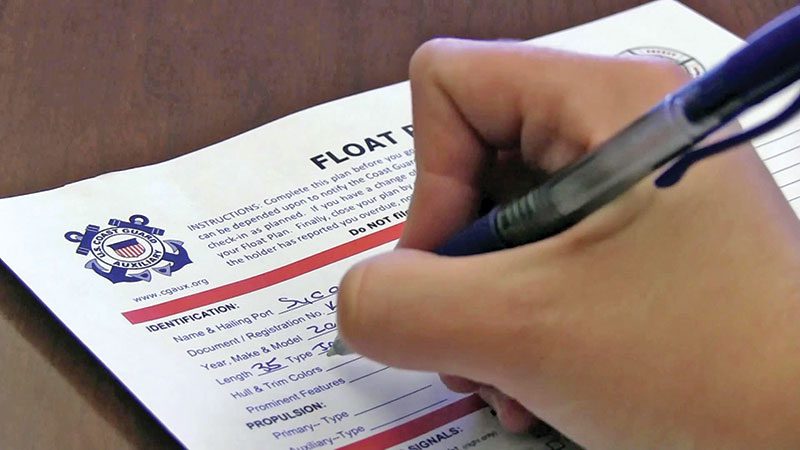
Whether diving, fishing, sailing or just cruising, a float plan can save your life! As I recall an actual scenario that played out here, not long ago, I’m again reminded of how important this is.
A friend of mine from the dive club set out one afternoon to dive with three others on board. Before leaving, he informed his wife of his float plan, to include the location and that he’d return before nightfall.
They started the dive like any other: they anchored up, geared up and splashed in, but left no one on the boat. They descended down the anchor line to the bottom to explore the shipwreck, but never saw it due to poor visibility and strong current. They left the anchor line to venture off a bit in order to find the wreck. Being fairly new divers, they didn’t realize or understand how strong the current actually was. After realizing they were lost on the bottom, they began a free ascent not realizing the current was still pushing them away from the boat. When they surfaced, they discovered the boat to be about 200 yards away. Knowing the two ladies with them could not swim the distance against the current, the strongest swimmer decided to make a go for it. He took off his gear (BCD and tank) and started swimming as hard as he could for the boat. Not making it very far, he tired out, gave up and returned to the group.
These four souls were now at the mercy of the sea and completely reliant on rescue. Shortly after dark, my friend’s wife, who the float plan was given too, called the Coast Guard. Searchers found the boat, but no divers in sight, so a grid search was initiated. Almost out of fuel, the chopper finally found them about nine miles from their boat and plucked them from the water, leaving their gear behind due to a shortage of fuel and weight restrictions.
After being in the water for over 14 hours, all were in some degree of hypothermia, even though the water was 86 degrees. There they sat in that chopper, without any gear, embarrassed, cold and miserable, but thankful to be alive because they were very aware the peril they just escaped.
When diving, always leave someone on board the boat. When heading out to sea for any reason, have and file a float plan. We all make mistakes. We can’t always be right when judging varying conditions, and circumstances can change in the blink of an eye. Someone ashore that knows your plans will make all the difference in the world should you make a deadly mistake or should things just turn bad.
Formal documents, ready to fill out with all required information, are available to use. This includes vessel description and name, number of souls on board, names, GPS locations, return time, emergency contact numbers, duration of trip and more. Even if you simply inform a spouse or friend of the day’s plan, just make sure someone knows about it.
This and similar scenarios happen way more often than you might think. If you are unfamiliar with the area you are diving, find someone who is, or hire a Dive Master operated dive charter.
And this is why I always say…”PLAN YOUR DIVE AND DIVE YOUR PLAN”
~ Capt. James Tew
